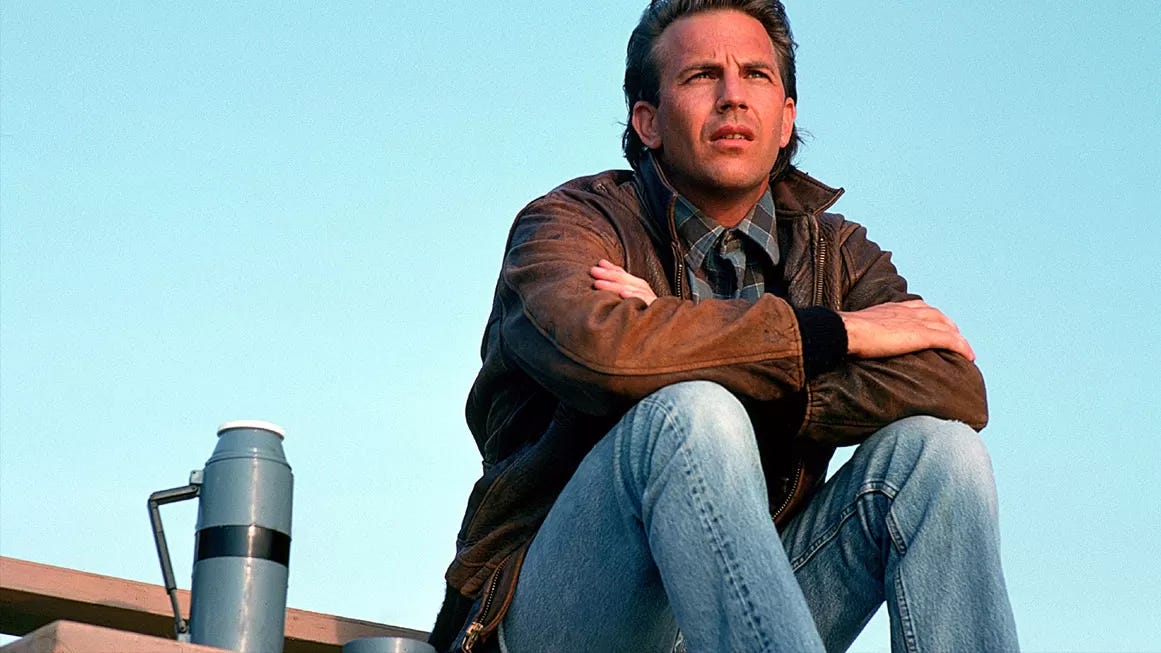Within twelve months of each other in the late 1980s, two of history’s most famous baseball films – both starring Kevin Costner – were released in cinemas. The first, Bull Durham (1988), was sexy and wittily irreverent. The second, Field of Dreams (1989), was twelve pounds of sentimentality in a four-pound bag. It was also phenomenally popular, and has since insinuated itself into the American cultural tapestry in much the same way as Spielberg’s Jaws or E.T.
Whenever Americans wish to exaggerate their virtue, or remind themselves of some glorious past of illusory innocence, baseball is often the prayer bead that’s fingered. Or at least those forms of baseball still presumed to be uncorrupted by commercialism and steroid use – the minor leagues and junior baseball.
In America, more than any other sport – or, indeed, just about any other cultural activity – baseball is the place to pray to the Gods of American virtue and invest one’s sentimentality and nostalgia. Consequently, baseball has inspired some of the most pious, faux-lyrical sports writing and some of the most obnoxiously mawkish films.
In this regard, Field of Dreams might be the crowning achievement of American sentimentality as strained through Hollywood and its national pastime. Based upon the 1982 novel Shoeless Joe by Canadian W.P. Kinsella, Field of Dreams has Iowan farmer Ray Kinsella (Costner) first visited in his cornfields by ethereal voices and then by the ghostly apparition of Shoeless Joe Jackson, the late outfielder for the Chicago White Sox. “If you build it, he will come,” the ghoul mysteriously promises, and Kinsella’s wife is generous enough not to suspect her husband’s psychotic breakdown and instead yields to his strange desire to remove a swathe of their crop and replace it with a baseball diamond.
The diamond becomes a liminal home for the ghosts of the 1919 White Sox, and while Kinsella’s wife anxiously crunches the family’s dire finances, Ray’s in the field reminiscing with spectres. His wife and children still cannot see or hear the spooks.
Perhaps the strangest element of this strange film is the character of Terence Mann, played by the late James Earl Jones, a reclusive writer and cultural theorist. By now, the spectral overtures are also shared by Ray’s wife, and when one night they both have identical dreams in which Ray goes to Boston’s Fenway Park with Mann, they agree that the writer has some mysterious role to play in the establishment of their ghostly amusement park.
Mann is obviously sceptical when Ray turns up on his Boston doorstep gibbering about dreams and ghosts and the cryptic promises of Shoeless Joe, but agrees to watch a baseball game with Ray where he finally concedes to having heard “the voices” also.
It is Terence Mann who delivers the film’s famous monologue, a weepy and curiously ahistorical tribute to American nostalgia. “People will come, Ray,” Mann says. “They’ll come to Iowa for reasons they can’t even fathom. They’ll turn up your driveway, not knowing for sure why they’re doing it. They’ll arrive at your door as innocent as children, longing for the past… This field, this game – it’s a part of our past, Ray. It reminds us of all that once was good, and it could be again.”
Field of Dreams did tell us plenty about America – for example, here’s nostalgia as cultural pathology and mass delusion. To start with, the ghostly ambassadors of that golden past are members of a team that fixed the 1919 World Series between Chicago and Cincinnati. Eight of them, including Jackson, were banned for life and precluded from induction into baseball’s hall of fame (the film suggests that these men now exist in some ghostly purgatory and to exit their limbo must engineer their redemption by helping Ray meet with his late father).
Anyway, that golden past of innocence? It was a time of explicit, state-sanctioned racism and the exclusion of black Americans from the game. A time of mob-ruled gambling syndicates and persistent match-fixing. In 1920, Cleveland’s Ray Chapman was killed when a pitch crushed his skull.
The most dominant player in this era was the legendary Ty Cobb, of the Detroit Tigers, who was also a barbarous and likely psychotic goon. Cobb was a vehement racist and self-obsessed tyrant, a man who boasted of pistol-whipping a man to death and once bashed an armless heckler in the crowd. His slides to base became notorious for their violence, in which he lunged with his deliberately sharpened spikes in an attempt to spear the leg of the baseman.
Cobb was the subject of a luridly sensationalised biography by Al Stump, parts of which were exaggerated or fabricated. But the facts of Cobb’s deranged personality remained: one of the game’s greatest players was a vicious thug who died friendless.
But America is nothing if not a myth factory. As baseball itself is mysticised, so too its famous exemplars, and secular Gods have been made from some dubious clay. Babe Ruth was a womanising drunk; Joe DiMaggio a sour miser and absent father.

Interestingly, Field of Dreams was re-written after a lawsuit was threatened by a man famously repelled by the dizzy myth-making of himself: the author J.D. Salinger. In the novel Shoeless Joe, the reclusive writer that Ray sets out to conscript to his dream is not the fictitious Mann, but Mr. Salinger.
Very few cultural artifacts are received with as much obsessive admiration as Salinger’s Catcher in the Rye – Dylan’s early albums would be another example. His sudden fame – though it went well beyond fame and became something like national priesthood – was deeply weird and unpleasant to him, and he spent the remaining decades of his life jealously and litigiously guarding his privacy.
Nonetheless, in Shoeless Joe, Salinger remains Ray’s Northern Star – no longer a man, but the mysterious totem he must find to unlock the secrets of his own dreams. Who could blame Salinger for not wanting to participate in a culture of such bizarre veneration? But of course his reclusiveness and cessation of publishing only served to mystify him more – nonetheless, he wanted nothing to do with Field of Dreams and forced the removal of his name.
The aftermath of Field of Dreams also told us something about America. The baseball diamond made for the film, in a farm just outside Dyersville, Iowa, quickly became – and still remains – a tourist attraction. Restricted by time, the film’s makers could not authentically cultivate the field’s lush grass and relied upon green paint to brighten parts of it. But more interestingly, the field itself – as to provide optimal sightlines to sunsets – was created upon the border of two family farms, thus seeding years of proprietorial bickering.
Hollywood built it, and yes they came, and hilariously each family established their own separate souvenir stand on their side of the land to capitalise on the stream of pilgrims. The two families – the Lansings and the Ameskamps – battled in court for years.
Ownership was not consolidated until 2007, when a monopoly on souvenir tack was finally achieved, before the farm’s sale in 2011. This invited even greater local animosity when the farm’s new owners proposed a giant redevelopment of the area they would call “Ballpark Heaven”. A group of local farmers took the proposal to court, arguing that the rezoning from agricultural to commercial was illegal. The project stalled.
The actor Dwier Brown, who plays Costner’s ghost dad in Field of Dreams, wrote a memoir called If You Build It… where he writes that the film “ends conveniently before the people arrive at the field… It’s one of the great things about movies that they can sort of create this fantasy that doesn’t exactly conform to the way people are, and the way laws are, and the way rules are.”
Well, that’s the thing about fantasy, isn’t it? It’s always convenient. In 2014, the film’s director, Phil Alden Robinson, expressed sacrilegious indifference about the diamond itself. “I have no feeling about it that it needs to be preserved as a shrine at all,” he said. “Movies are ephemeral. I kind of like the idea of sort of nature taking over again.”
Of course, movies aren’t ephemeral – not all of them, anyway. They live on amongst fans’ obsessive admiration, and their power to flatter cultural dreams. Field of Dreams remains significant, but for lessons that it never intended.





I love this story! You've threaded such intricacies of modern American history together, its wonderful!